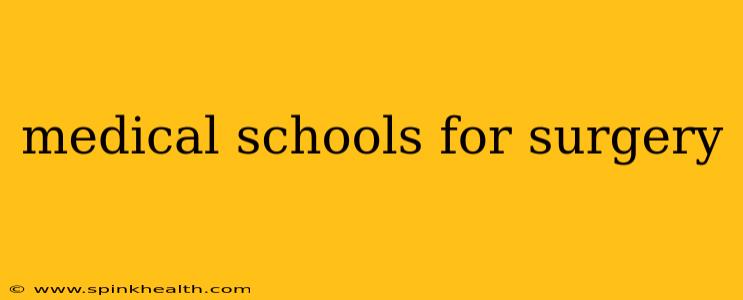The Scalpel's Call: A Journey Through Top Medical Schools for Surgery
The dream of becoming a surgeon is a powerful one, fueled by a desire to heal, to innovate, and to make a tangible difference in people's lives. But the path to wielding the scalpel is long and demanding, beginning with the crucial decision of choosing the right medical school. This isn't just about academic excellence; it's about finding an institution that fosters the skills, mentorships, and environment necessary to cultivate a successful and compassionate surgical career.
This journey begins with understanding the multifaceted landscape of surgical training. It's not a single specialty, but a diverse field encompassing cardiothoracic surgery, neurosurgery, orthopedic surgery, plastic surgery, and many more. Each requires specific skills and a unique learning environment. The best medical school for you will depend on your chosen surgical specialty and your personal learning style.
Let's explore some key factors to consider and answer some frequently asked questions about choosing a medical school for surgery.
What are the best medical schools for general surgery?
This is a question with no single definitive answer. Rankings change yearly, and "best" is subjective and depends on your individual needs and aspirations. However, consistently high-ranking institutions with renowned surgical programs include:
-
Harvard Medical School: Known for its rigorous curriculum, research opportunities, and prestigious faculty, Harvard consistently attracts top surgical talent. The sheer volume of resources and collaboration opportunities is unparalleled.
-
Johns Hopkins University School of Medicine: A pioneer in medical research and innovation, Johns Hopkins boasts a strong surgical residency program, attracting some of the brightest minds in the field. Its reputation for groundbreaking research is a major draw for aspiring surgeons.
-
Stanford University School of Medicine: Located in the heart of Silicon Valley, Stanford offers a unique blend of cutting-edge technology and traditional medical expertise. This creates an environment ripe for innovation in surgical techniques and technology.
-
University of Pennsylvania Perelman School of Medicine: With a long history of excellence in surgical training, Penn offers a highly competitive and comprehensive surgical program. Their commitment to both clinical practice and research is exceptional.
-
University of California, San Francisco (UCSF) School of Medicine: UCSF is known for its strong emphasis on patient care and its leading role in developing innovative surgical techniques. Their diverse patient population provides invaluable experience.
These are just a few examples – many other excellent medical schools offer exceptional surgical training programs. Researching specific faculty members and their areas of expertise within a chosen subspecialty is crucial.
How do I choose the right medical school for surgical training?
Choosing the right medical school is a personal journey. Consider these factors:
-
Program Reputation and Faculty: Look beyond rankings and investigate the specific surgical department. Research faculty members, their areas of expertise, and their publication records. Look for mentors who align with your interests.
-
Research Opportunities: Surgical innovation is constantly evolving. Access to research labs and opportunities to participate in research projects is invaluable for future career advancement.
-
Clinical Exposure: A strong emphasis on hands-on clinical experience is vital. Look for schools with robust clinical rotations and opportunities for early exposure to surgical settings.
-
Location and Lifestyle: Consider the location of the medical school and its surrounding environment. Do you prefer a bustling city or a quieter campus setting?
-
Match Rate: Examine the school's historical match rate for surgical residencies. This indicates the success rate of graduates securing residency positions in their desired specialty.
What are the prerequisites for medical school for surgery?
The prerequisites are generally the same for all medical schools. You'll need a strong undergraduate education with a focus on science courses (biology, chemistry, physics), a high GPA, a competitive MCAT score, and strong letters of recommendation. However, demonstrating a genuine interest in surgery through research experience, shadowing surgeons, or volunteer work will significantly strengthen your application.
What surgical specialties are in high demand?
The demand for surgical specialists fluctuates, but several areas consistently see high demand:
-
Cardiothoracic Surgery: The complexity and high-stakes nature of this field necessitate highly skilled surgeons.
-
Neurosurgery: The intricacies of brain and spine surgery require exceptional precision and expertise.
-
Orthopedic Surgery: A rapidly growing population and increasing rates of musculoskeletal injuries create a significant need for orthopedic surgeons.
-
Plastic Surgery: This field encompasses reconstructive and cosmetic surgery and remains in high demand.
Ultimately, choosing the right medical school for surgery requires careful research, self-reflection, and a clear understanding of your aspirations. It's a journey that demands dedication, perseverance, and a passion for healing – a journey that begins with the right first step.

